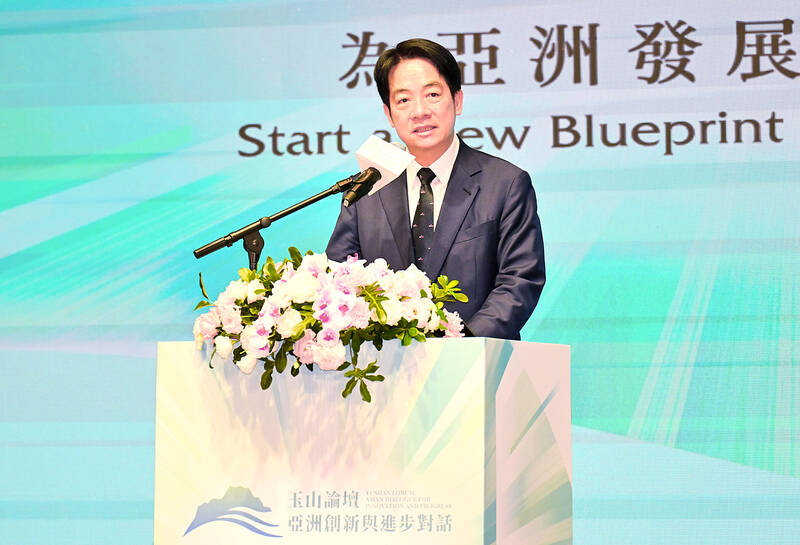Taiwan is to continue being a force for good and deepen ties with Indo-Pacific countries to contribute to building a new Asia that is inclusive and resilient, Vice President William Lai (賴清德), the Democratic Progressive Party (DPP) presidential candidate, said at the Yushan Forum in Taipei yesterday.
Lai was invited to give opening remarks for a roundtable discussion titled “Start a New Blueprint for Asian Development,” calling on participants to “imagine a more advanced and more prosperous Asia.”
The Indo-Pacific “is one of the most important geopolitical areas in the 21st century,” contributing almost 65 percent of the world’s GDP, Lai said.

Photo: Tien Yu-hua, Taipei Times
“As long as the Indo-Pacific region is stable and prosperous, the world will be stable and prosperous as well,” he said.
Taiwan is willing to collaborate with like-minded partners to promote democracy, peace, security and prosperity in the region through “dialogue, consensus building and advancing mutually beneficial cooperation,” Lai said.
As a force for good, the nation always upholds the spirit of “Taiwan helps Asia, Asia helps Taiwan,” with the New Southbound Policy being a good example, he said.
Under the policy, Taiwan has trained more than 1,300 local medical personnel in Southeast Asia and India, Lai said, adding that bilateral trade between Taiwan and the New Southbound Policy countries increased by 88 percent, while total investment increased by 121 percent over the past seven years.
Lai also said that talents are at the core of any policy and added: “When individuals have hope, the nation has hope.”
Regarding challenges such as rising authoritarianism, net zero transition and digitalization in the post-COVID-19 pandemic era, Lai said that no country can handle them alone.
“Alone, we may go fast, but together, we can go far,” he said, calling on countries in the region to unite in the effort to achieve inclusiveness in the new Asia.
“When the world needs Taiwan, we will always be there,” he added.
In the roundtable discussion that followed, Ivan Kanapathy, who served on the White House’s National Security Council as director for China, Taiwan and Mongolia, said that Taiwan plays a “crucial and irreplaceable role” in the Indo-Pacific strategies of the US.
The US seeking economic cooperation with Taiwan, such as wooing investment from Taiwan Semiconductor Manufacturing Co (TSMC, 台積電), is also an effort to enhance deterrence, Kanapathy said.
The US is “moving in the right direction” in its policies related to the region.
Indian lawmaker Sujeet Kumar thanked Taiwan for being a force for good and extending a helping hand to countries in need, adding that the New Southbound Policy has significantly strengthened Taiwan’s position globally, especially in Southeast Asia.

The brilliant blue waters, thick foliage and bucolic atmosphere on this seemingly idyllic archipelago deep in the Pacific Ocean belie the key role it now plays in a titanic geopolitical struggle. Palau is again on the front line as China, and the US and its allies prepare their forces in an intensifying contest for control over the Asia-Pacific region. The democratic nation of just 17,000 people hosts US-controlled airstrips and soon-to-be-completed radar installations that the US military describes as “critical” to monitoring vast swathes of water and airspace. It is also a key piece of the second island chain, a string of

A magnitude 5.9 earthquake that struck about 33km off the coast of Hualien City was the "main shock" in a series of quakes in the area, with aftershocks expected over the next three days, the Central Weather Administration (CWA) said yesterday. Prior to the magnitude 5.9 quake shaking most of Taiwan at 6:53pm yesterday, six other earthquakes stronger than a magnitude of 4, starting with a magnitude 5.5 quake at 6:09pm, occurred in the area. CWA Seismological Center Director Wu Chien-fu (吳健富) confirmed that the quakes were all part of the same series and that the magnitude 5.5 temblor was

Taiwan will now have four additional national holidays after the Legislative Yuan passed an amendment today, which also made Labor Day a national holiday for all sectors. The Chinese Nationalist Party (KMT) and Taiwan People’s Party (TPP) used their majority in the Legislative Yuan to pass the amendment to the Act on Implementing Memorial Days and State Holidays (紀念日及節日實施辦法), which the parties jointly proposed, in its third and final reading today. The legislature passed the bill to amend the act, which is currently enforced administratively, raising it to the legal level. The new legislation recognizes Confucius’ birthday on Sept. 28, the

The Central Weather Administration has issued a heat alert for southeastern Taiwan, warning of temperatures as high as 36°C today, while alerting some coastal areas of strong winds later in the day. Kaohsiung’s Neimen District (內門) and Pingtung County’s Neipu Township (內埔) are under an orange heat alert, which warns of temperatures as high as 36°C for three consecutive days, the CWA said, citing southwest winds. The heat would also extend to Tainan’s Nansi (楠西) and Yujing (玉井) districts, as well as Pingtung’s Gaoshu (高樹), Yanpu (鹽埔) and Majia (瑪家) townships, it said, forecasting highs of up to 36°C in those areas